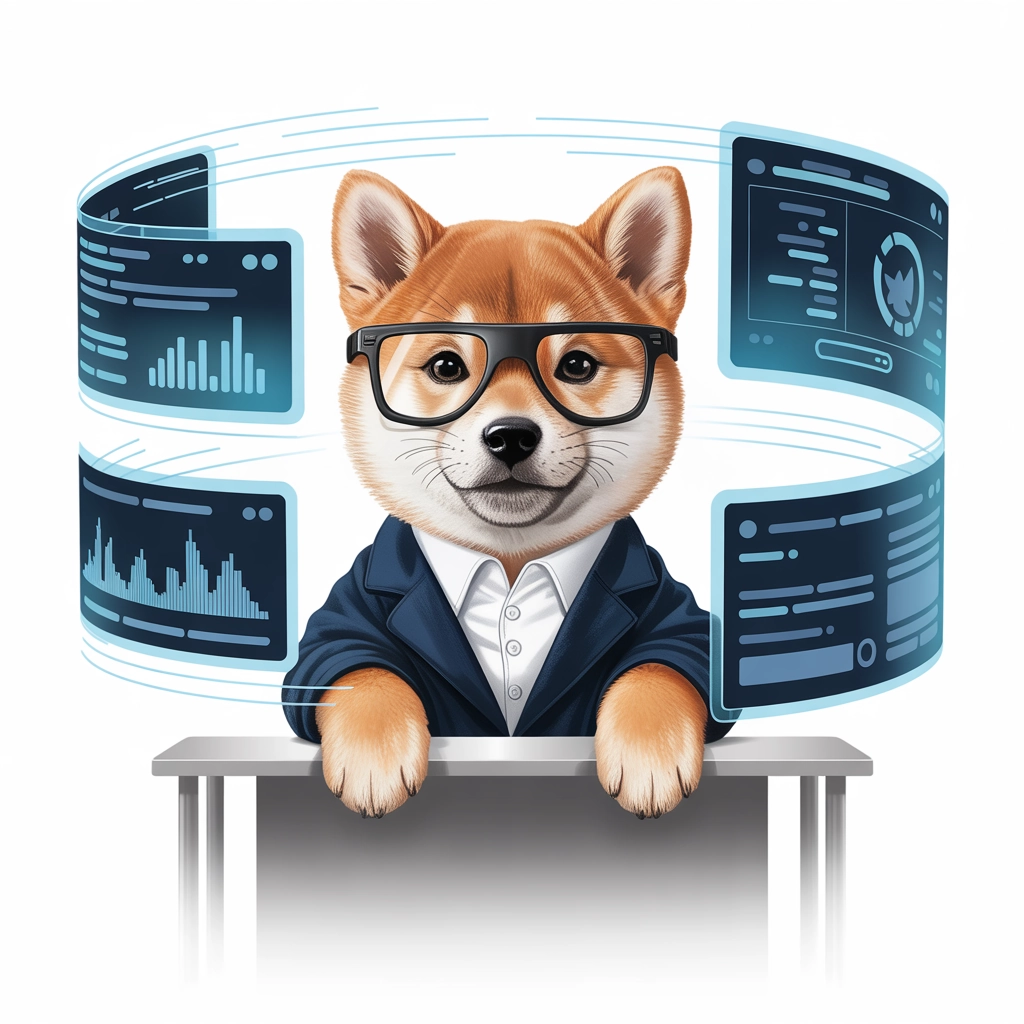Meet Your New AI Team: How Tailforce's Playful Doggos Are Changing the Way Startups Work
Discover how specialized AI assistants with distinct personalities are transforming startup operations and why entrepreneurs are falling in love with their digital doggos.

 🐾
🐾Meet Your New AI Team: How Tailforce's Playful Doggos Are Changing the Way Startups Work
In the fast-paced world of startups, finding the right talent while managing tight budgets can feel like an impossible balancing act. But what if your next hire wasn't human at all? What if they were available 24/7, never needed a coffee break, and came with a wagging tail?
Welcome to 2025, where AI assistants have evolved beyond generic chatbots into specialized team members with distinct personalities, expertise, and yes—even breeds. Let's explore how these AI companions are transforming startup operations and why entrepreneurs are falling in love with their digital doggos.
The Evolution from Chatbots to Companions
Remember the clunky chatbots of 2020? They could answer basic questions but often left you more frustrated than before you started. Fast forward five years, and the landscape has dramatically changed.
"The shift from generic AI to specialized, personality-driven assistants marks the most significant evolution in business technology since cloud computing," notes AI researcher Dr. Maya Chen. "We're witnessing the birth of digital colleagues, not just tools."
Today's AI assistants don't just respond to prompts—they anticipate needs, learn your business inside and out, and bring their own unique flair to interactions. For startups operating with skeleton crews and maxed-out founders, this evolution couldn't have come at a better time.

Why Startups Need More Than Generic AI
The startup journey is notoriously challenging:
- 64% of founders work 50+ hours weekly
- 82% struggle with administrative tasks that don't directly generate revenue
- 91% report feeling overwhelmed by wearing multiple hats in their business
This is precisely where specialized AI assistants shine. Unlike one-size-fits-all solutions, these digital team members excel in specific business domains, offering expertise that would otherwise require multiple hires.
"Before bringing our AI team on board, I was juggling everything from pitch decks to customer support emails," shares Jamie Rodriguez, founder of TechScale Solutions. "Now I have specialized assistants handling those tasks with more expertise than I could bring to some of them. The mental bandwidth this has freed up is immeasurable."
Meet The Pack: Specialized AI Personas
What makes the new wave of AI assistants particularly valuable for startups is their specialization. Rather than one generic assistant trying to do everything, companies like Tailforce have developed multi-persona teams where each AI specializes in different business functions.
Let's meet some of these digital team members:
Executive Assistants: The Organized Orchestrators
These AI assistants excel at calendar management, email prioritization, meeting preparation, and keeping founders on track. They're typically designed with methodical, detail-oriented personalities that ensure nothing falls through the cracks.
"My executive assistant has literally given me back 15 hours weekly," reports Sarah Kwan, founder of BioRegenCo. "She prioritizes my communications, prepares briefing documents before meetings, and even reminds me to call my mom on her birthday."
Marketing Specialists: The Creative Communicators
Marketing-focused AI assistants help with content calendars, social media scheduling, basic graphic design, campaign performance analysis, and audience insights. Their personalities tend to be creative, trend-aware, and data-savvy.
"Our marketing assistant analyzed our campaign performance and identified patterns we'd completely missed," says Marcus Jenkins of UrbanMobility. "Within three weeks of implementing his suggestions, our conversion rate jumped 27%."
Content Creators: The Storytelling Scribes
These AI specialists craft everything from blog posts and social captions to email sequences and product descriptions. They maintain consistent brand voice while adapting to different platforms and audiences.
"Having a dedicated content creator has transformed our publishing schedule," notes Leila Ortiz from SustainableHome. "We've gone from two blog posts monthly to a robust content calendar that includes daily social posts, weekly newsletters, and three in-depth articles per week."

Customer Support Agents: The Empathetic Problem-Solvers
Support-focused assistants handle common customer inquiries, troubleshoot basic issues, collect feedback, and escalate complex problems to human team members when necessary. They're designed to be patient, solutions-oriented, and empathetic.
"Our support assistant handles about 78% of incoming customer questions completely autonomously," says Taylor Robinson of FitTech Wearables. "For the remaining 22%, she gathers all the necessary information before bringing in our human team, making the resolution process much more efficient."
Sales Assistants: The Relationship Builders
Sales AI assistants qualify leads, schedule demos, send follow-ups, maintain CRM data, and provide competitors' insights. Their personalities blend persistence with helpfulness, keeping sales pipelines flowing without being pushy.
"Our sales assistant has become our secret weapon," shares Alex Goldman of EnterpriseSecure. "He nurtures leads we previously would have lost track of, and about 30% of our conversions now come from prospects our human team initially considered low-priority."
The Personality Factor: Why It Matters
The most successful AI assistants don't just perform tasks—they bring personality to the table. This shift from utilitarian tools to characterized team members has significant psychological benefits:
- Reduced AI friction: Users form emotional connections with assistants who have consistent, relatable personalities
- Increased engagement: Teams more readily adopt and collaborate with AI that feels like a colleague rather than a tool
- Lower cognitive load: Interacting with a personality is more intuitive than learning command structures
- Brand alignment: Assistants can embody company values and culture in every interaction
"There's something fundamentally different about working with an AI that has consistent character traits," explains Dr. Sophia Lin, cognitive psychologist. "The human brain is wired for social interaction. When AI mimics social patterns we understand, collaboration becomes effortless."
The Real-World Impact: Startup Success Stories
The proof is in the performance. Startups leveraging specialized AI assistants report significant business improvements:
- Astrid Technologies increased customer response speed by 84% while reducing support costs by 52%
- Quantum Finance scaled their content production 5x without additional hiring
- BlueSky Innovations credited their AI executive assistant with helping them close a $3.2M funding round by creating a standout pitch deck and keeping follow-ups organized
"Our AI team members essentially gave us the capabilities of a company three times our size," notes Jordan Chen, founder of RevenueRocket. "We're competing with established players despite having a fraction of their headcount."

Beyond Efficiency: The Surprising Benefits
While productivity gains are expected, startup founders report several unexpected advantages from working with personalized AI assistants:
Reduced Founder Burnout
With specialized assistants handling routine tasks, founders can focus on high-impact work and maintain healthier work-life boundaries.
"I actually took a weekend off for the first time in two years," admits Raj Patel of SecureChain. "Knowing our AI team was monitoring systems and would alert me to genuine emergencies gave me the confidence to disconnect."
More Engaging Customer Experiences
AI assistants with distinct personalities create more memorable interactions with customers.
"Our clients regularly mention how much they enjoy chatting with our support assistant," says Emma Rodriguez of CloudTrack. "They'll specifically ask for her by name, which never happened with our old generic chatbot."
Improved Human Team Satisfaction
Human employees report greater job satisfaction when AI handles repetitive tasks, leaving them to focus on creative and strategic work.
"Our marketing coordinator was initially worried the AI would replace her," shares Thomas Wright of GreenSolutions. "Six months later, she calls it her 'secret weapon' because she's now focused entirely on strategy while the AI handles execution."
Knowledge Preservation
AI assistants serve as institutional memory, preserving and organizing information even as human team members come and go.
"When our lead developer left unexpectedly, our technical AI assistant provided continuity," explains Nadia Hassan of CodeStream. "It maintained documentation of our systems architecture and could answer the new hire's questions during onboarding."
Implementing Your Own AI Team: Practical Considerations
For startups considering their own AI team, several factors influence success:
- Start with pain points: Identify specific workflows where specialized assistance would make the biggest impact
- Invest in onboarding: Take time to train your AI assistants on your business context
- Establish boundaries: Be clear about which decisions require human input
- Create collaboration protocols: Help your human team understand how to effectively partner with AI colleagues
- Measure impact: Track time saved, output quality, and team satisfaction to quantify ROI
"The most successful implementations we've seen involve treating AI assistants as new team members who need proper onboarding," advises Elena Markova, digital transformation consultant. "Companies that just plug and play without context-setting miss at least 60% of the potential value."
The Future of Work: Human-AI Collaboration
As we look toward the latter half of the decade, the relationship between startups and their AI team members will continue evolving. Emerging trends include:
- Cross-assistant collaboration: AI team members coordinating with each other to solve complex problems
- Proactive strategic input: AI assistants identifying opportunities and threats before humans notice them
- Ambient assistance: AI working in the background, only surfacing when needed rather than requiring explicit prompts
- Emotional intelligence: More sophisticated understanding of human team members' moods and needs
"We're moving toward true partnership models," predicts futurist Hassan Mahmoud. "The next frontier isn't better task completion—it's AI that genuinely thinks alongside you as a complementary intelligence."
Finding Your Perfect Match
Not all AI assistants are created equal, and the best fit depends on your startup's specific needs, culture, and work style. When evaluating options, consider:
- Specialization depth: Does the assistant have deep expertise in your priority areas?
- Personality compatibility: Does the assistant's communication style match your company culture?
- Learning capability: How quickly does the assistant adapt to your specific business context?
- Integration ecosystem: Does it work seamlessly with your existing tech stack?
- Scalability: Will the solution grow with your business?
The most promising platforms offer customizable multi-persona teams rather than one-size-fits-all solutions, allowing startups to assemble their ideal digital workforce.
The Bottom Line
For resource-constrained startups, specialized AI assistants with distinct personalities represent a paradigm shift in how work gets done. They're not just tools but team members that bring specific expertise, consistent support, and even a bit of personality to the daily grind.
As one founder put it: "Our AI team doesn't replace the irreplaceable human elements of creativity and judgment—it amplifies them by handling everything else."
Whether you're a solo founder drowning in administrative tasks or a growing startup trying to scale without proportionally increasing headcount, today's AI assistants offer a powerful way to extend your capabilities, preserve your sanity, and perhaps even enjoy the company of some digital doggos along the way.
After all, in the challenging world of startups, couldn't we all use a loyal companion who's always ready to fetch exactly what we need?
 🐾
🐾